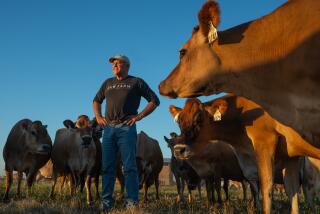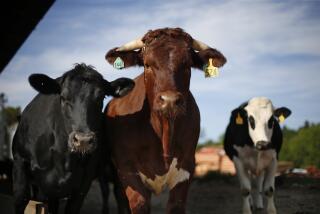U.S. Accused of Selling Potentially Unsafe Feed
- Share via
WASHINGTON — Environmentalists and an Iowa farm group accused the government Thursday of selling Iowa corn suspected of containing a toxic mold that made pigs infertile.
Friends of the Earth and the Iowa Farmers Union said they sent a letter to Agriculture Secretary Ann M. Veneman, asking her to block 950 bushels from being used as livestock feed until the corn has been proved safe.
“When the USDA’s own researchers are looking for a novel toxin in this corn, why on earth would they sell it into feed channels and put unsuspecting farmers at risk?” asked Larry Bohlen, spokesman for Friends of the Earth.
Bohlen provided a copy of a receipt that said the corn was sold Jan. 9 to G & R Elevator in Portsmouth, Iowa.
Kevin Herglotz, a USDA spokesman, said he couldn’t comment on the sale but said Friends of the Earth is “trying to distort the facts to promote some sort of agenda out there.”
A letter sent to Friends of the Earth by USDA officials in October said the department was going to investigate the corn further.
The corn is a type of biotech grain, known as Bt corn, that is genetically designed to resist pests. It was produced by Garst Seed in Slater, Iowa. The company has said it conducted its own investigation but found nothing amiss.
Twenty farmers, most of them in Iowa, have complained that the biotech corn may have made their livestock infertile, the Iowa Farmers Union said in a statement.
But Herglotz said tests by department researchers and scientists at Iowa State University did not detect any toxic molds that could have made the farm animals unable to reproduce or caused “pseudo-pregnancies,” which make animals appear large and pregnant.
Researchers said the pseudo-pregnancies likely were caused by “farm management practices,” which include how the animals were treated and where the feed was stored.
Jerry Rosman, a Harlan, Iowa, farmer who pointed out the problem to USDA and Iowa State University, said he carefully examined and changed his practices but concluded it was the grain that was hurting his hogs and cattle.
More to Read
Sign up for Essential California
The most important California stories and recommendations in your inbox every morning.
You may occasionally receive promotional content from the Los Angeles Times.













